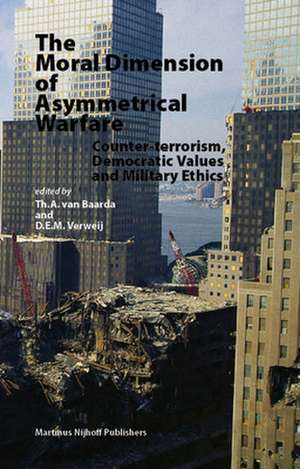The Moral Dimension of Asymmetrical Warfare: Counter-terrorism, Democratic Values and Military Ethics
Editat de Th.A. van Baarda, D.E.M. Verweijen Limba Engleză Hardback – 29 iun 2009
Preț: 974.39 lei
Preț vechi: 1188.29 lei
-18% Nou
Puncte Express: 1462
Preț estimativ în valută:
186.47€ • 193.57$ • 155.49£
186.47€ • 193.57$ • 155.49£
Carte indisponibilă temporar
Doresc să fiu notificat când acest titlu va fi disponibil:
Se trimite...
Preluare comenzi: 021 569.72.76
Specificații
ISBN-13: 9789004171299
ISBN-10: 9004171290
Pagini: 529
Dimensiuni: 168 x 246 x 33 mm
Greutate: 0.93 kg
Editura: Brill
Colecția Brill | Nijhoff
ISBN-10: 9004171290
Pagini: 529
Dimensiuni: 168 x 246 x 33 mm
Greutate: 0.93 kg
Editura: Brill
Colecția Brill | Nijhoff
Cuprins
PART I The superpower and asymmetry
Chapter 1 Questioning the Resort to U.S. Hegemonic Military Force
Harry van der Linden
Chapter 2 Asymmetric Air War: Ethical Implications
Martin L. Cook and Mark Conversino*
PART II Jus ad Bellum, Jus in Bello, Jus post Bellum: Rethinking the
Just War Tradition
Chapter 3 Reframing Asymmetrical Warfare: Beyond the Just War Idea
Thomas Frank
Chapter 4 Armed Intervention and Democratic Dreams: Small Western
Liberal Democracies and Multinational Intervention
Allard Wagemaker
Chapter 5 Asymmetric Warfare and Morality: From Moral Asymmetry
to Amoral Symmetry?
Carl Ceulemans
Chapter 6 Military operations by armed UN peace-keeping missions:
An application of generalized just war principles
John W. Lango
PART III Leadership and accountability
Chapter 6 The Moral Dimension of Asymmetrical Warfare:
Accountability, Culpability and Military Effectiveness
Daren Bowyer
Chapter 8 British Leaders and Irregular Warfare
David Benest
Chapter 9 The Lesson Avoided: The Official Legacy of the My Lai
Massacre
Lawrence P. Rockwood
Chapter 10 Culpability – Senior Leaders Have Dirty Hands
Donald A. MacCuish
PART IV Soldiers’ perspectives
Chapter 11 Between Violence and Restraint: Human Rights,
Humanitarian Considerations, and the Israeli Military in the Al-Aqsa Intifada
Eyal Ben-Ari
Chapter 12 The Phenomenon of Breaking the Silence in Israel:
“Witnessing” as Consciousness Raising Strategy of Israeli Excombatants
Erella Grassiani
PART V Ethical Education and Decision-making for the Military
Chapter 13 Ethics in the Core of Officer Education: Some Philosophical
Aspects for Curriculum Transformation
Jarmo Toiskallio
Chapter 14 Why People Make the Wrong Choices – The Psychology of Ethical Failure
J. Peter Bradley
Chapter 15 (Dis)respecting the Law of Armed Conflict in Asymmetrical Warfare?: A Consequentialist Approach to a
Consequentialist Question
Daniel S. Blocq
Chapter 16 Moral Dynamics in Culture Centric Warfare
Patrick Mileham
PART VI Stress and trauma
Chapter 17 Dilemmas in the Employment of Combat Stress-related
Clinical Research – the Imperative of Prevention
Eric Vermetten
PART VII The media
Chapter 18 Politics, Media and War Coverage: an Indexed Relation?
Javier G. Marín and Óscar G. Luengo
Chapter 19 Asymmetrical Warfare and Modern Digital Media: An Old
Concept Changed by New Technology?
Uroš Svete
PART VIII Democracy under Scrutiny
Chapter 20 Security versus Liberty?:Ethical Lessons from Post-9/11
American Counter-Terrorist Security Politics
Wim Smit
Chapter 21 Saying no to torture: a moral absolute, self-righteous or just naïve?
Maureen Ramsay
Chapter 22 Dirty War, or: How Democracies Can Lose in the Fight against Terrorism
Asta Maskaliūnaitė
PART IX In Hindsight
Chapter 23 Human Dignity in the Era of Counter-terrorism
Ted van Baarda and Désiree Verweij.
Chapter 1 Questioning the Resort to U.S. Hegemonic Military Force
Harry van der Linden
Chapter 2 Asymmetric Air War: Ethical Implications
Martin L. Cook and Mark Conversino*
PART II Jus ad Bellum, Jus in Bello, Jus post Bellum: Rethinking the
Just War Tradition
Chapter 3 Reframing Asymmetrical Warfare: Beyond the Just War Idea
Thomas Frank
Chapter 4 Armed Intervention and Democratic Dreams: Small Western
Liberal Democracies and Multinational Intervention
Allard Wagemaker
Chapter 5 Asymmetric Warfare and Morality: From Moral Asymmetry
to Amoral Symmetry?
Carl Ceulemans
Chapter 6 Military operations by armed UN peace-keeping missions:
An application of generalized just war principles
John W. Lango
PART III Leadership and accountability
Chapter 6 The Moral Dimension of Asymmetrical Warfare:
Accountability, Culpability and Military Effectiveness
Daren Bowyer
Chapter 8 British Leaders and Irregular Warfare
David Benest
Chapter 9 The Lesson Avoided: The Official Legacy of the My Lai
Massacre
Lawrence P. Rockwood
Chapter 10 Culpability – Senior Leaders Have Dirty Hands
Donald A. MacCuish
PART IV Soldiers’ perspectives
Chapter 11 Between Violence and Restraint: Human Rights,
Humanitarian Considerations, and the Israeli Military in the Al-Aqsa Intifada
Eyal Ben-Ari
Chapter 12 The Phenomenon of Breaking the Silence in Israel:
“Witnessing” as Consciousness Raising Strategy of Israeli Excombatants
Erella Grassiani
PART V Ethical Education and Decision-making for the Military
Chapter 13 Ethics in the Core of Officer Education: Some Philosophical
Aspects for Curriculum Transformation
Jarmo Toiskallio
Chapter 14 Why People Make the Wrong Choices – The Psychology of Ethical Failure
J. Peter Bradley
Chapter 15 (Dis)respecting the Law of Armed Conflict in Asymmetrical Warfare?: A Consequentialist Approach to a
Consequentialist Question
Daniel S. Blocq
Chapter 16 Moral Dynamics in Culture Centric Warfare
Patrick Mileham
PART VI Stress and trauma
Chapter 17 Dilemmas in the Employment of Combat Stress-related
Clinical Research – the Imperative of Prevention
Eric Vermetten
PART VII The media
Chapter 18 Politics, Media and War Coverage: an Indexed Relation?
Javier G. Marín and Óscar G. Luengo
Chapter 19 Asymmetrical Warfare and Modern Digital Media: An Old
Concept Changed by New Technology?
Uroš Svete
PART VIII Democracy under Scrutiny
Chapter 20 Security versus Liberty?:Ethical Lessons from Post-9/11
American Counter-Terrorist Security Politics
Wim Smit
Chapter 21 Saying no to torture: a moral absolute, self-righteous or just naïve?
Maureen Ramsay
Chapter 22 Dirty War, or: How Democracies Can Lose in the Fight against Terrorism
Asta Maskaliūnaitė
PART IX In Hindsight
Chapter 23 Human Dignity in the Era of Counter-terrorism
Ted van Baarda and Désiree Verweij.
